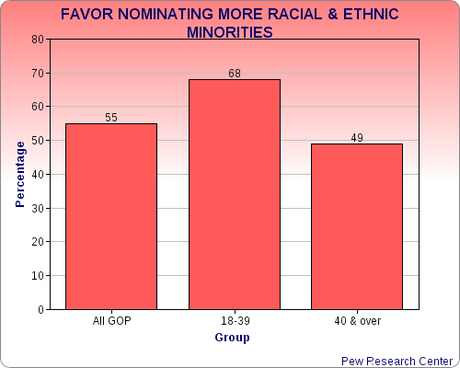
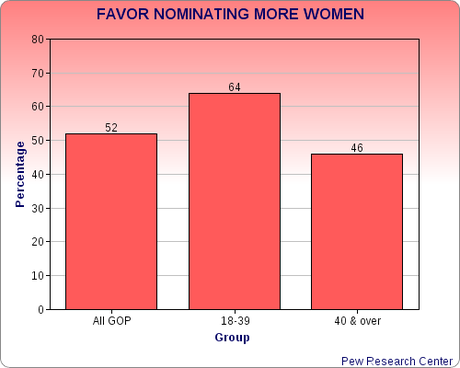
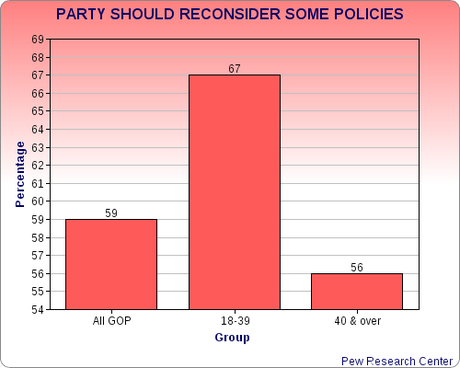 The charts in this post were made from information from the Pew Research Center -- and was mostly gleaned from a poll done between July 17th and 21st of 1,480 adults with a 3 point margin of error (6 points among only Republicans). That survey showed that while most Republicans wanted their party to change, a majority of them wanted the party to move even further to the right.
The charts in this post were made from information from the Pew Research Center -- and was mostly gleaned from a poll done between July 17th and 21st of 1,480 adults with a 3 point margin of error (6 points among only Republicans). That survey showed that while most Republicans wanted their party to change, a majority of them wanted the party to move even further to the right.The GOP base seems to think that they live in a right-wing country -- probably because they is what they want to believe. They are wrong, just as wrong as progressives who would like to think the United States is a progressive country. The truth is, like it or not, the United States is now (and always has been) a very moderate country. While Americans would like to see change that benefits all citizens, they want that change to come slowly (so mistakes can be kept to a minimum). Most Americans believe there are dangers at both ends of the political spectrum.
There is no doubt that the current Republican Party has moved far to the right -- and in no way can be considered moderate. That is why they have been soundly defeated in the last two presidential elections. Even though the GOP was able to hold on to a majority in the House, that was due to some very effective gerrymandering, and not because most voters favored the GOP (since Democrats got over a million more votes in House races than the GOP did).
The question is whether the GOP will moderate its views to appeal to more voters, or continue their path to marginalization. Pew recently looked at young voters in the party (18 to 39) versus older party members (40 & over) to see if the future might hold a more moderate GOP electorate. And as the three charts above show, the younger members do have some different views than their older peers. Note that 19% more of the young would like to see the party nominate more racial & ethnic minority candidates, 18% more would like to see them nominate more women, and 11% more would like for the party to reconsider some of its policies.
At first glance, it might seem like the younger party members might exert a more moderating influence on the party, and steer it back toward the middle of American politics. But when you look closer at the survey, you see that is just an illusion. Take note of these three additional charts from that same survey:
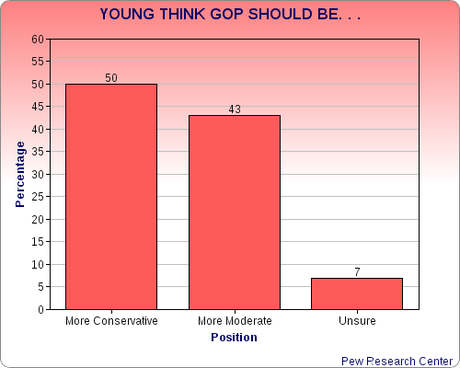
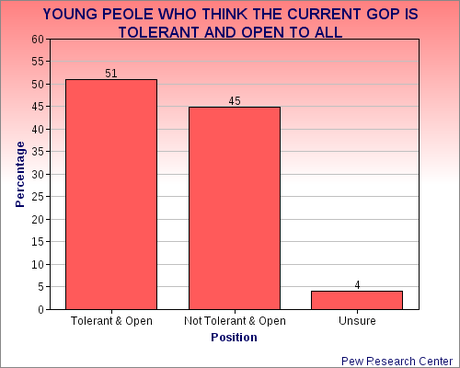
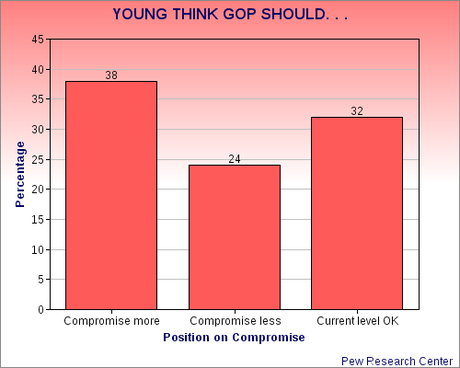 While most of the young Republicans would like to see their party nominate more ethnic & racial minorities and more women, they seem to hold this position because they think those people could be used as "tokens" to convince more people to vote for them. But they are not willing to change their policies toward those groups to garner more votes. In fact, the change that a majority of them would like to see is not toward moderation -- but to move even further to the right (just like their elders want to see).
While most of the young Republicans would like to see their party nominate more ethnic & racial minorities and more women, they seem to hold this position because they think those people could be used as "tokens" to convince more people to vote for them. But they are not willing to change their policies toward those groups to garner more votes. In fact, the change that a majority of them would like to see is not toward moderation -- but to move even further to the right (just like their elders want to see).A majority of the young actually see their current party as being "tolerant and open to all", in spite of their anti-immigrant, anti-minority, anti-woman, and anti-equality policies. And they don't want to see their party compromise with the Democrats to get needed legislation. Only a meager 38% would like to see more compromise, while 56% would not -- with 24% wanting less compromise (an impossibility) and 32% saying the current level of compromise (which is no compromise at all) is enough.
If the very few remaining moderates in the Republican Party are hoping that young people will help move their party to the center (and back into the mainstream of American politics) -- that hope is probably a very remote one. Younger Republicans seem to be pretty happy with the direction of their party. And that is just sad, because a democracy needs at least two parties (reasonable parties with solutions instead of ideologies).

